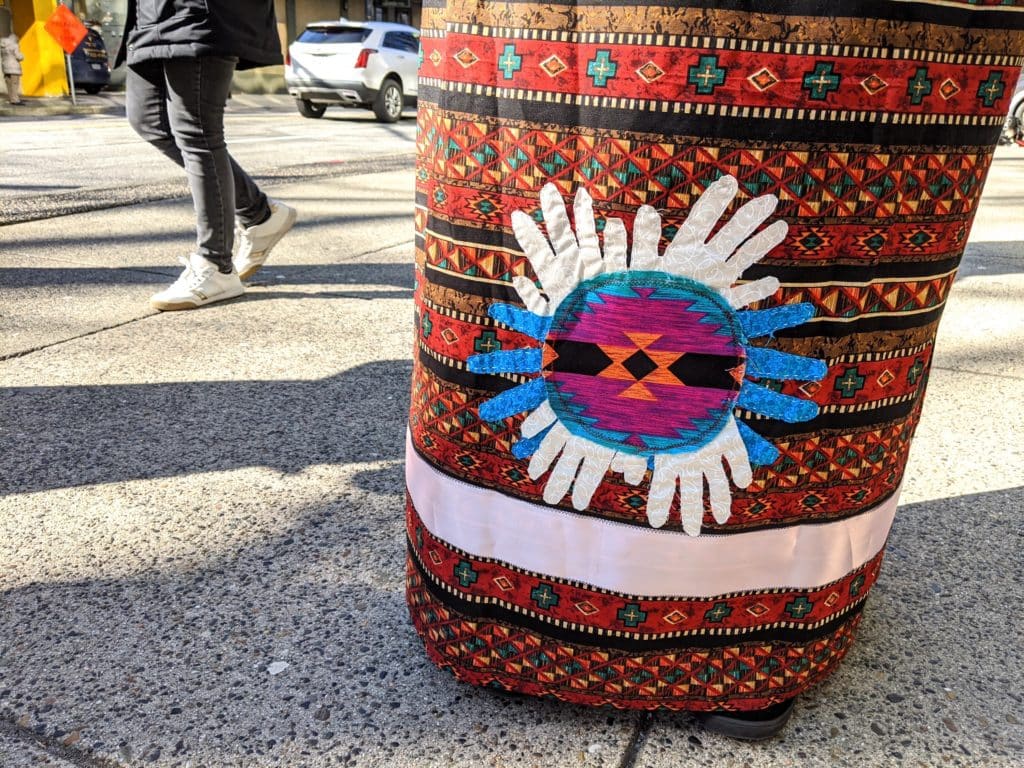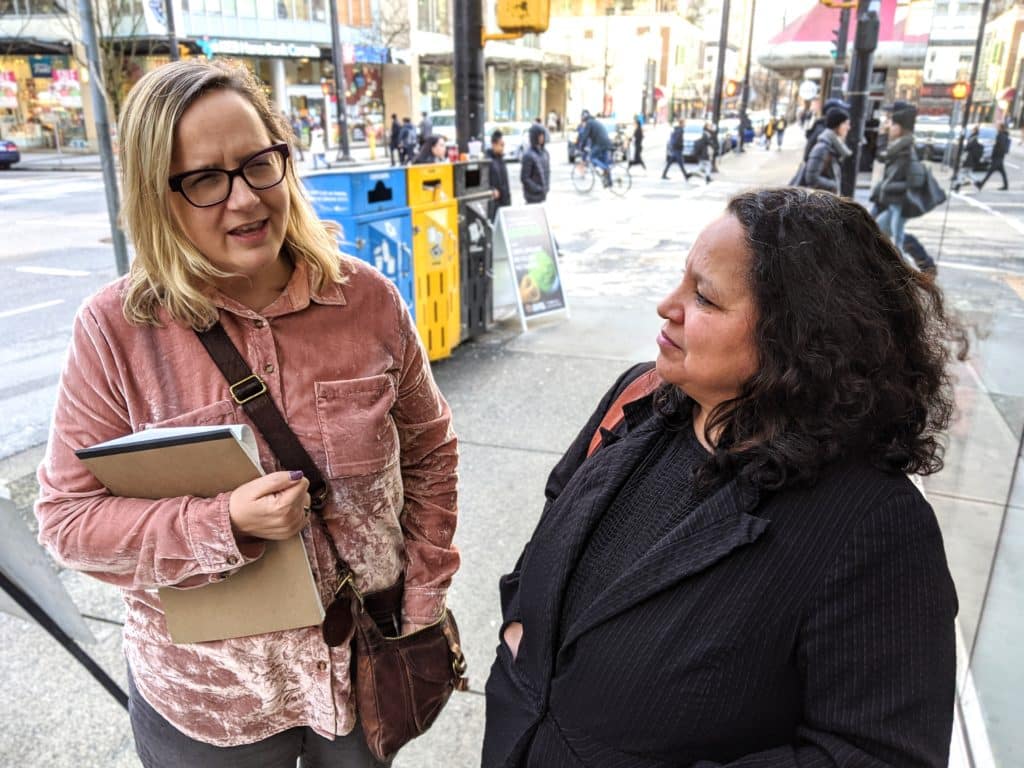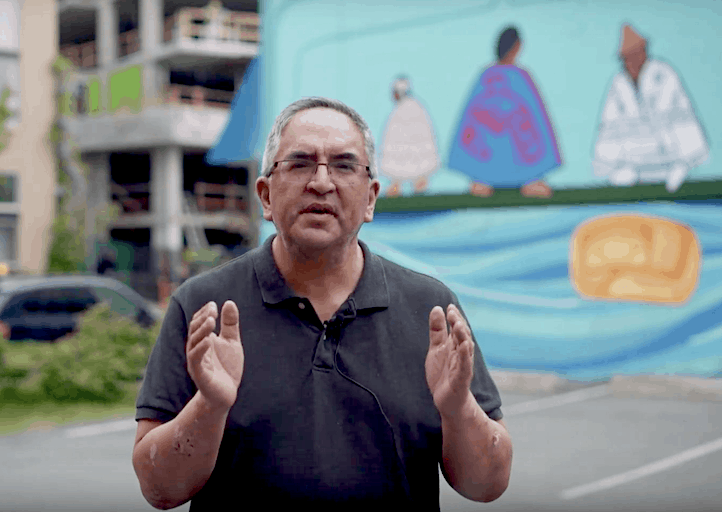
Content warning: This story mentions violence and deals with the subject of child apprehension. Please take care of your spirit and read with care.
An Afro-Indigenous mother was discriminated against during the three years her children were in “care,” the B.C. Human Rights Tribunal has ruled — facing racist stereotypes from social workers who failed to provide proper support.
In the second-highest award in the tribunal’s history, the Vancouver Aboriginal Child and Family Services Society (VACFSS) has been ordered to pay the woman $150,000 “as compensation for injury to her dignity, feelings, and self-respect.”
The ruling was released Tuesday and it’s being called a “precedent-setting case” that could make a difference for other Indigenous families facing discrimination at the hands of a system disproportionately stacked against them.
‘No amount of money can give back those years’
The mother’s four daughters were apprehended by social workers from VACFSS — an Indigenous-led agency delegated by the provincial government to serve Indigenous families — in 2016.
The girls were placed in three different homes. The two middle children were set up together in a “staffed residence” after their foster placement broke down, where they endured “serious harm” including: “self-harm, inter-sibling violence, violence with staff, and the application of physical restraints,” according to the tribunal’s decision.
Justine — whose real name is being withheld to protect her children’s privacy — had limited access to her children. For six months, visits were completely cut off, the tribunal heard.
She spent almost three years fighting to get them out of “care,” and her children were returned to her in 2019.
In August 2017, Justine filed a complaint with the B.C. Human Rights Tribunal, kicking off a long process that would include 21 hearing days over 17 months.
On Nov. 22, the tribunal found VACFSS discriminated against Justine based on her Indigeneity and disabilities, violating section eight of the B.C. Human Rights Code.
When Justine got the news, she felt “a wave of emotions.”
“Of course I was happy, but at the same time, it reminded me of the years that I missed with my kids,” she told IndigiNews.
“Yeah, it’s a win, but did my family really win? No amount of money can give back those years that I missed.”
Systemic discrimination and stereotypes
Justine was “pushed to the brink of hope” during her battle with VACFSS, according to the tribunal’s decision. During her testimony, she said she was “mentally and physically and emotionally, just exhausted.”
“I felt like I was under water and VACFSS is sitting here on a rowboat watching me drown and not even helping me” she said.
The case “illuminates systemic discrimination,” according to tribunal member Devyn Cousineau.
In her 150-page decision, Cousineau wrote that Justine’s case is “the effect of a wider web of laws, policies, and practices which interact to create a system stacked against Indigenous families, especially single mothers living in poverty, with disabilities, and with children with disabilities.”
She draws clear lines between Justine’s experience and well-documented issues in the system that disadvantage Indigenous families.
For example, she points out that assessments used by social workers fail to acknowledge how perceived risks like “poverty, addiction, unstable housing, prior involvement with child welfare, and historical and intergenerational trauma” are expressions of colonialism that can “usually be alleviated with proper supports.”
However, VACFSS failed to offer Justine concrete supports, Cousineau wrote. Instead, “it set out a list of tasks for her to accomplish on her own” and then kept moving the goalposts.
Assessments also “focus exclusively on the risk posed to the children by remaining in the care of their families,” while failing to “measure or account for the risks posed to Indigenous children who are taken into care.”
In Justine’s case, VACFSS had a pattern of “downplaying or ignoring significant issues impacting the girls’ wellbeing as a consequence of their being in care while at the same time focusing on [Justine’s] behaviour to conclude that she was the real threat.”
Many risk assessment tools don’t give proper weight to “the strengths in a parent’s resilience or connection to culture,” she added, citing research by Peter Choate and Gabrielle Lindstrome.

“VACFSS failed to account in any meaningful way for the strength of Justine’s connection to her culture, and its significant benefits to the children’s emotional wellbeing,” Cousineau wrote.
In making decisions about custody and access, the tribunal found social workers leaned on stereotypes about Indigenous mothers and people living with mental health issues.
Stereotypes “help to explain why VACFSS persistently interpreted [Justine’s] behaviour in the most negative light possible,” the ruling states.
“For example, if [Justine] appeared tired or with a low affect, rather than consider that she might be tired and stressed, the immediate speculation was about her sobriety and use of alcohol,” Cousineau wrote.
“When she resisted offers of collaboration, she was labelled as aggressive and angry, or unwilling to put her children first.”
In reviewing VACFSS’s protection concerns about the children’s physical and emotional well-being, Cousineau found there wasn’t enough evidence to substantiate them — and justify keeping the girls from their mother.
Ultimately, she found “the heart of this purported child protection concern was [Justine’s] conflict with VACFSS.”
As an intergenerational survivor of the residential school system and as someone who spent time in “care” herself, Justine had a profound distrust of VACFSS, Cousineau pointed out.
“This distrust was at the root of her conflict with VACFSS, and required a human rights response,” she wrote.
Because of her Indigeneity and the trauma she has faced, Justine had a heightened need to be included in decisions regarding her children and their wellbeing, Cousineau added.
“Instead, VACFSS responded to her with escalating assertions of power and control, reducing and suspending her access to the children, limiting her communication with their caregivers, and ultimately prolonging their time in care.”
On the whole, Cousineau found the discrimination in this case to be “profound.” In describing the impacts, she let Justine’s testimony speak for itself.
“I was denied to be a mother to my kids and they needed me because they were emotionally upset and it’s very clear in all of these documents — they just wanted to be with their mom. And I was denied that. We were denied to be a family,” she testified.
‘A precedent-setting case’
Cousineau nailed “every issue and then some,” said Frances Rosner, a Métis family law lawyer who served as co-counsel for Justine, alongside human rights lawyer Aleem Bharmal.
As an Indigenous lawyer who works in “the daily grind of the provincial court” — within the colonial framework of the Child, Family and Community Service Act — Rosner said she’s “overjoyed with the outcome.” And she plans to reference this decision in future cases.

“It’s such a precedent-setting case. It’s such an incredible recognition of the circumstances that thousands of Indigenous parents face across this country,” she said.
“These really egregious and horrific histories that so many Indigenous parents have experienced — and then contend with in the present day — are being used against them adversely.”
She said Justine’s case is yet another example of children “getting harmed at alarming rates in foster care.” And right now, she said Indigenous parents essentially “don’t have any rights” when it comes to challenging decisions made by the province or its delegated agencies.
“In keeping with reconciliation we absolutely have to do things differently going forward, and part of doing that differently is approaching mothers like [Justine] through a very informed and compassionate lens.”
Bharmal said Justine was the first parent to succeed in having their complaint against the child-welfare system heard by the tribunal. As previously reported for The Discourse, while a few other discrimination cases have been brought to the tribunal by families against the Ministry of Children and Family Development, the tribunal decided the evidence provided in those cases wasn’t strong enough to warrant a hearing.
Cousineau wrote that the only other case she’s aware of “where a human rights body ordered compensation to an Indigenous caregiver for discrimination in child welfare is First Nations Caring Society” — a case that’s been making headlines since 2007.
Bharmal said tribunal decisions such as these can influence other cases across the country.
“They’re not binding on other jurisdictions, but if it’s a significant case, other jurisdictions can … study them carefully and refer to them, and hopefully adopt some of the principles that were articulated.”
A story of Indigenous resistance
Cousineau wrote that Justine’s story is one of Indigenous resistance.
“[Justine] is a racialized Afro-Indigenous woman,” she wrote. “She is resourceful, affectionate, a leader in her community, connected to her culture, and loves her children.”
VACFSS was also born out of Indigenous resistance, Cousineau pointed out. The agency was established by First Nations leaders in 1992 as an alternative to “colonial child welfare.”
Its main focus during the ‘90s, according to VACFSS’s website, was family support services. It “offered advocacy and support to families involved with the ministry and to whom there was a risk of becoming involved in the child protection system.”
Today its board of directors “is comprised entirely of accomplished Indigenous people with a commitment to the urban Indigenous community,” wrote Cousineau.
The agency’s “roots in Vancouver’s urban Indigenous community, and significant efforts to mitigate or eliminate the discriminatory impacts of child welfare, are important and recognized.” But these roots and awareness “do not immunize it from the anti-Indigenous racism that is pervasive in Canadian society more broadly and within child welfare specifically.”
VACFSS is “bound to apply provincial child welfare legislation,” she added. In other words, it has to play by a colonial rulebook.
IndigiNews requested an interview with VACFSS, but the agency did not respond in time for publication. On Wednesday, it released a statement.
“We are now reviewing the tribunal’s decision in detail, but note that the focus of the decision was on the rights of the mother, while from VACFSS’ perspective, parental rights must be balanced with the well-being of children and our responsibility to care for and honour each child as a ‘sacred bundle,’” reads the statement, in part.
“The tribunal acknowledged that VACFSS already prioritizes policies and training about how to serve Indigenous Peoples in child welfare … but we will explore other learnings and continue to enhance and expand on our collaborative efforts and processes, including ongoing partnerships with First Nations communities across Canada.”
Justine said she believes her case is “definitely going to change the way families and moms of Aboriginal ancestry are going to be treated moving forward.”



